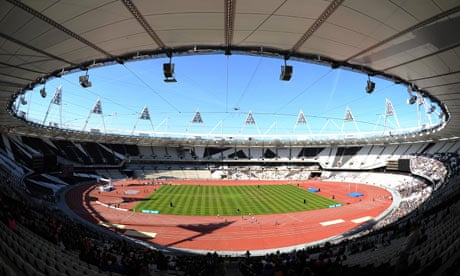And so it is that the socio-economic model of the 21st century attains its iconic apotheosis: a gated community with added surface-to-air missiles.
Read the relevant reports about how Olympic security is going to affect the residents of Bow Quarter, E3, and the details only confirm the story's absurdity – to quote from the Guardian, "the Star Streak missiles that are likely to be installed on top of a water tower … travel at more than three times the speed of sound, have a range of 5km and use a system of three dart-like projectiles to allow multiple hits on a target." Just to truly warm our cockles, they're made in the UK – Belfast, to be precise – though according to Wikipedia, they will not protect east London quite as soundly as other ordnance options. Star Streaks, it seems, lack "the armour penetration capabilities of a purpose-built anti-tank guided missile or a dual purpose missile such as Air Defence Anti-Tank System". The latter is manufactured in Switzerland; the Thai army likes them, apparently.
At which point, it is surely worth reflecting on the stupendous insanity boiling around the Olympics, and the fact that sport has become only a detail. Small wonder, of course – the founding idea of the modern games was an expression of the rise of the nation state, and ever since, the resulting spectacle has always crystallised two things: first, the unrivalled power of governments to lay on such gigantic and ludicrously wasteful spectacles; and second, whatever madness is swirling around the host country. Running, jumping and swimming, by comparison, will always be an added extra.
In Moscow (1980), the Olympics displayed the vanities of what might be called late communism, just as the invasion of Afghanistan revealed fatal Soviet hubris. In Los Angeles (1984), the games embodied the decisive arrival of the consumer capitalism that has since eaten the planet (my favourite bits of the opening and closing ceremonies were Lionel Richie, and the 84 grand pianos). Beijing (2008) attested to the niceness of the Chinese state by forcibly moving 1.5 million people to clear the way for Olympic buildings and installations, and allowing no opening for any noises-off about such minor matters as Tibet. And Berlin in 1936 barely needs mentioning, though it's worth bearing in mind the subsequent comments of Baron Pierre de Coubertin, the founder of the International Olympic Committee: "People are worried … by the fact that the 1936 games were illuminated by Hitlerite strength and discipline. How could it have been otherwise? On the contrary, it is eminently desirable for the games to be thus clothed, with the same success, in the garment woven for them over four years by each people."
Or, rather, some people. In London, the games will be an expression of three of the most rotten aspects of our version of modernity: surveillance and the arms trade; out-of-control consumerism; and most spectacularly, the fact that the elites who make their money out of these things have been barely touched by the crisis that is ruining lives across the planet. The fact has been barely commented on, but needs repeating: no matter that this week sees thousands of disabled people having their income cut by £100 a week, or that endless areas of public provision are being hacked down at speed: the cost to the public of Sebastian Coe's fantasies, and an orgy of corporate hospitality, is currently put at £11bn. £11bn! Meanwhile, the distance between 99.9% of people and the Olympic elite has been beautifully demonstrated by perhaps the event's most unpleasant bit of symbolism: those "Games lanes", along which dignitaries and sponsors will be sped to east London, while the rest of us sweat our way through likely gridlock.
And who are we talking about? The event's "worldwide partners" include Coca-Cola, McDonald's (looking forward to temporarily opening its biggest outlet, apparently), Procter & Gamble, and good old Atos, the people whose UK division is seeing to those already-infamous tests for incapacity benefit (there's a point to be made here about the latter bigging up a festival of physical prowess, while so swiftly passing judgment on the supposed fitness of thousands of people on benefits, but someone may make it more gracefully on the thread below).
That'll be them, racing through the capital, in the company of politicians and droves of hangers-on: if you want a suitably grim picture of London in mid-to-late summer, picture Jeremy Hunt (if, by some dark magic, he's still around), relaxing in the back of a people carrier with a free Angus Deluxe and fries, with people getting rich on so-called welfare reform hot in pursuit. Meanwhile, those members of the general public who have managed to get tickets to events usually not of their choosing (I have a friend who is inexplicably excited about going to watch handball) will not be able to bring their own food and drink, and will enter the games complex via that well known embodiment of sporting glory, Westfield Stratford City. In the context of all that, who exactly wins the 200m men's butterfly – or the handball – may seem kind of irrelevant.
By way of illustrating how worked up some people get about all this, I've just received a copy of a polemic by the French academic Marc Perelman, published by Verso, and titled Barbaric Sport: a Global Plague. It earnestly shreds not just the Olympics, but also pretty much the whole of modern sport ("Sport is a consequence of the level of development of the productive forces under capitalism", it says here). And though its prose style is rather gluey and its points a little too earnest even for me, fair play to him: if you've got a thinking brain, it strikes me as pretty poor to be averting your eyes from the Olympics' most basic aspects, and claiming that it will simply cheer us all up. To quote good old Guy Debord, those 16 days may well amount to "nothing more than an image of happy harmony surrounded by desolation and horror, at the calm centre of misery": as the burgers are bought in their hundreds and the missile systems whirr away, 2012's underlying awfulness brought to life, spectacularly.

